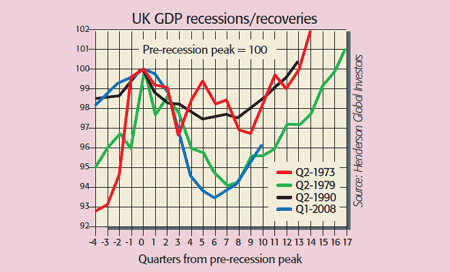
The economy expanded twice as fast as expected in the third quarter. It grew by 0.8% between July and September, down from the 1.2% in April to June, but enough to make the last six months the best two successive quarters since 2000. Growth is 2.8% up on a year ago. We are recovering slightly faster than after the 1980 recession (see chart) but have still only made up just over a third of the lost ground since the 2008 peak. National output is back to where it was in mid-2006. Gilt yields and sterling rose on the news, as it means more quantitative easing this year is now highly unlikely.
There was good news too from ratings agency Standard & Poor’s. Nodding to the tough fiscal consolidation announced in the spending review, it reaffirmed Britain’s triple-A credit rating and nudged its outlook up from negative to stable. All three major ratings agencies now put Britain in their safest possible categories.
What the commentators said
This is only the preliminary estimate of third-quarter GDP, as Jeremy Warner pointed out on Telegraph.co.uk. Still, the first GDP number tends to be revised upwards. And it’s “really encouraging” to see how broadly based the recovery is. Manufacturing is growing at a reasonable pace, while the service sector and construction were key contributors. Still, “the big test has yet to come”.
The fiscal squeeze kicks off in earnest next year, with spending cuts and tax rises over the next four years amounting to £81bn, or 6% of GDP. Meanwhile, “tight credit conditions continue to pose a significant obstacle” to economic activity, said IHS Global Insight’s Howard Archer. According to the British Bankers’ Association, business lending kept falling in September, while mortgage lending expanded at the slowest rate for ten years and approvals hit an 18-month low.
First-time buyers are “drying up”, said James Moore in The Independent. This means further house-price falls, which have “a huge impact” on consumer confidence. On the external front, weak growth in the US, a major trading partner, may offset the weak pound.
The hope is that business investment will offset the squeeze on the government and consumers. Companies seem to be moving into “more of an expansion mode”, said Simon Ward of Henderson Global Investors. Business confidence has improved and demand for financing in order to make acquisitions is on the rise again, said Tracy Corrigan in The Daily Telegraph. It helps that the corporate sector generally resisted the temptation to borrow too much during the credit bubble. The 500,000 public-sector jobs to be lost should be replaced, given the 343,000 created by the private sector in the first half of this year.
Quite how much impact the coming squeeze will have on the economy we won’t know for some time. But it is heading into it with more momentum than expected, said Economist.com, so worries over a double-dip recession may have been overdone.